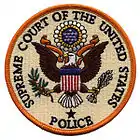Supreme Court Police
The Supreme Court of the United States Police is a small U.S. federal law enforcement agency headquartered in the District of Columbia, whose mission is to ensure the integrity of the constitutional mission of the Supreme Court of the United States by protecting the Supreme Court building, the Justices, employees, guests, and visitors.[1] The Supreme Court Police falls under the jurisdiction of the Marshal of the United States Supreme Court who is appointed by the Supreme Court.[2] The Marshal and the Supreme Court Police are authorized to police the Supreme Court Building and protect the Justices, employees of the Court, and visitors to the Court.[3]
| Supreme Court of the United States Police | |
|---|---|
 | |
 Badge of a US Supreme Court Police Officer | |
| Agency overview | |
| Formed | 1935 |
| Employees | 145 |
| Jurisdictional structure | |
| Federal agency | U.S. |
| Operations jurisdiction | U.S. |
| Governing body | Marshal of the United States Supreme Court |
| General nature | |
| Operational structure | |
| Headquarters | Washington, D.C |
| Sworn members | 145[1] |
.jpg.webp)
History
Established in 1935, the Supreme Court security force was tasked to provide protection for the new Supreme Court building.[4] The Court had previously resided in the United States Capitol, and the original force of 33 officers were selected from the ranks of the United States Capitol Police. In October 2018, Security Today reported that the force consisted of 125 officers.[5]
Legislation authorized the Police to carry firearms in 1982.[4]
Duties
Currently, the Supreme Court Police are responsible for protecting the Chief Justice, Associate Justices, building occupants, and the Court's historic building and grounds. Additional responsibilities include courtroom security, dignitary protection, emergency response, and providing assistance to building visitors.[1]
Units of the Supreme Court Police include:[5]
- Uniformed Services
- Protective Services
- Threat Assessment Unit
- Background Investigation Unit
- Honor Guard
- Key Response Squad
- HazMat/Bomb Response
- Canine Unit
Supreme Court officers are trained at the Federal Law Enforcement Training Center in Georgia. They may retire at the age of 50 with 20 years of qualifying service, or at any age with 25 years of service. They are awarded "enhanced retirement benefits".[6]
In 2016, the starting salary for a newly hired member of the Supreme Court Police was $60,000 a year (at the time, the national average for police officers, regardless of seniority, was $53,000).[4]
Notable incidents
When Justice David Souter was mugged while jogging in 2004, commentators questioned why his protective detail hadn't been present.[7] Members of the Police explained that Justices prefer to rely on their relative anonymity for protection.
In October 2018, crowds protested the appointment of Brett Kavanaugh.[8] 165 protestors were arrested by Capitol Police, and 5 were arrested by Supreme Court Police.
See also
References
- Koerner, Brendan I. (2004-05-03), "Who Protects David Souter?", Slate, retrieved 2007-04-27
- 28 U.S.C. § 672
- 40 U.S.C. § 6121
- Bathroom Readers' Institute (2016). Uncle John's UNCANNY Bathroom Reader. Simon and Schuster. ISBN 9781626867604.
-
Ralph C. Jensen (2018-10-10). "Securing the Supreme Court: Who protects the Court and its inhabitants?". Security Today. Retrieved 2019-01-26.
Who protects the court and its inhabitants? Does the Supreme Court receive protection from the Secret Service? The short answer is no. Unlike most members of the federal judiciary, they do not received protection from the U.S. Marshals Service either.
- United States Office of Personnel Management, Federal Law Enforcement Pay and Benefits: Report to the Congress, 2004; pp. 2, 13.
- Tony Mauro (Fall 2005). Lifting the Veil: Justice Blackmun's Papers and the Public Perception of the Supreme Court. Missouri Law Review. pp. 1–2. Retrieved 2019-01-26.
-
Tara Bahrampour (2018-10-08). "Most of the protesters arrested during Kavanaugh confirmation have been released". Washington Post. Retrieved 2019-01-26.
But five people arrested at the Supreme Court remained in the D.C. jail over the weekend, said Kathleen Arberg, a court spokeswoman.
